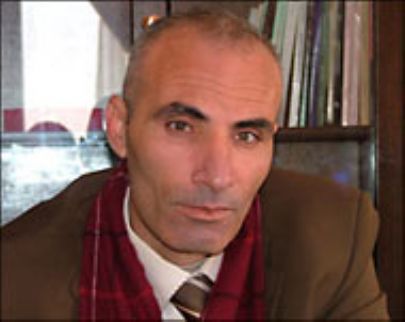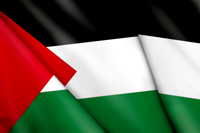Index relies entirely on the support of donors and readers to do its work.
Help us keep amplifying censored voices today.
 A leading Palestinian human rights activist has claimed that freedom of speech is far greater under the Hamas regime in Gaza than in the Fatah-controlled West Bank.
A leading Palestinian human rights activist has claimed that freedom of speech is far greater under the Hamas regime in Gaza than in the Fatah-controlled West Bank.
Khalil Abu Shamala, director of the al-Dameer Centre For Human Rights – which works in both Gaza and the West Bank – said that although there were still occasional arrests of Fatah members, “nowadays we don’t document many violations”.
He noted that this was partly down to Hamas’s weakness in the face of international pressures, particularly the breakdown of relations with the Egyptian regime.
In the past, Hamas has made large-scale arrests of journalists and called many others in for questioning, with opposition activists and bloggers facing harassment.
But although abuses still occurred in Gaza, Abu Shamala said that government forces in the Palestinian Authority–controlled West Bank took much harsher action against critics.
“Freedom of expression in Gaza is better than in the West Bank,” he told Index on Censorship. “We have many cases where the PA arrest and attack people because they criticize them on Facebook, and many Facebookers in the West Bank use alternative names, not their real names. But here, they speak without any harassment by Hamas.”
A rift between Hamas and Fatah, which culminated in the Islamist group seizing power in the Strip in 2007, has led to the creation of two near-separate entities in Gaza and the West Bank. Hamas refuses to recognise the Jewish state and is under an embargo by Israel and the international community.
“I don’t know why, but in the West Bank, Palestinian Authority security systems have cooperation and coordination with Israel – and they don’t want to give the opportunity for a third intifada, and they don’t want to allow Hamas or those who are against the Palestinian Authority [to speak out] because they know many of the Palestinians in the West Bank hate the Palestinian Authority,” Abu Shammala continued.
Hamas has previously issued proceedings against Abu Shamala for his outspoken criticism of the Islamist group.
“After they took over Gaza, they wanted from the beginning to impose their Islamic agenda on the society,” he said, adding that his organisations and others had tried to combat these efforts.
The Hamas deputy foreign minister, Ghazi Hamed, denies that his government took any action to silence their critics.
“We are not oppressing people and people can speak loudly, can criticise the government, can criticise Hamas,” said Hamed. “We never put anyone in jail who criticizes Hamas or write something against Hamas. We have different organisations, political parties, even writers, they have full freedom to write what they want.”
A Palestinian news agency closed down in the Gaza Strip for allegedly fabricating reports regarding Hamas and their support for pro-Morsi Egyptian Islamist groups is to reopen after four months.
The decision to allow work once again at the offices of Ma’an News Agency, the largest independent TV, radio and online media group in the West Bank and Gaza Strip, was the result of a meeting between the Hamas leader President Haniyeh and those of Palestinian factions on Saturday. According to Khaled al-Batsh, leader of the Islamic Jihad Movement, the meeting was called by Haniyeh to deliberate issues in the Gaza Strip, including potential reconciliation among Palestinian political factions. The Palestinian president Mahmoud Abbas’s Fatah movement was not represented at the meeting.
A spokesman for Hamas, Ehab Ghissin, stated that Haniyeh “gave his instructions for the Ministry of Information to open the agency’s bureau” as long as Ma’an abides by professionalism and accuracy in its work.
The office of Ma’an was closed down in July after publishing reports suggesting Hamas was involved in supporting terror groups opposed to Egypt’s new regime. Citing Israeli sources the article stated the Hamas government gave refuge to fugitive leaders of the Egyptian Muslim Brotherhood in a Gaze hotel. After the meeting President Haniyeh spoke of the importance of a positive relationship between Egypt and Palestine, emphasising that Hamas is a national movement that does not depend on external organisations.
The decision to reopen the news office in Gaza was welcomed by Ma’an General Director, Raed Othman. “Ma’an aims to provide its media services to all Palestinians everywhere,” he said, adding that the news organisation will attempt to increase its activity in the area in the coming weeks.
The Saudi Arabian news channel Al-Arabiya was also shut down for the same reason and at the same time as Ma’an. Despite discussion during Saturday’s meeting to reopen Al-Arabiya too, the organisation remains closed in the Gaza Strip. The news channel has openly stated it was in favour of the removal of President Morsi from power.

(Photo: Shutterstock)
The internet is a vital platform for Palestinians to express themselves, but web access and targeting of social media users, bloggers and journalists remain big challenges, according to a new report from the Palestinian Center for Development and Media Freedom (MADA).
“The internet and the broad tools of communication made available by the social networks gained great importance specifically in the lives of Palestinians in Gaza, who have been under firm siege by the Israeli occupation forces since 2006, and for the Palestinian people in general due to the dispersion they have experienced since the Nakba of 1984 [sic], and now they can communicate with their relatives and friends in the different parts of the world quickly and immediately”, said Mr. Mousa Rimawi, MADA’s general director.
The report states that 67% of Palestinians polled by MADA in 2012 believe Facebook contributes to the promotion of freedom of expression.
However, the latest figures quoted show that internet penetration in Palestine is at 32.1%; 34.3% in the West Bank and 27.9% in the Gaza Strip. Lack of infrastructure due to the Israeli occupation and high service charges are the biggest blocks to access, the report finds.
The report also highlighted threats to journalists working in Palestine. Examples included the imprisonment of Al Quds TV reporter Mamdouh Hamamrah for posting an image deemed to be offensive to President Mahmoud Abbas, and the arrest of journalist Esmat Abdel Khalek for a comment she made on Facebook demanding an end to the Palestinian Authority.
“Violations against journalists and citizens simply for expressing their opinions lead to the strengthening of self-censorship, which is incompatible with the idea of having the social platforms that is suppose to make it easier for citizens and journalists to express their opinions”, said Riham Abu Aita, a MADA spokesperson.
The article was edited on 30 September at 12.00 pm to acknowledge an error in the quote from Mr. Mousa Rimawi, which gives the year of the Nakba as 1984, it took place in 1948.
Gaza’s de-facto Hamas government closed the office of Al Arabiya, Palestinian network Ma’an news and the local production company Lens on Thursday.
Ma’an reported the incident as having received a closure order from the Attorney General delivered directly to their offices. Al Arabiya published a report from their Gaza correspondent, stating that employees had been prevented from entering their offices by the Hamas authorities, who told them that would be arrested if they entered at any point.
Lens was shut down after Hamas took objection to their providing of professional services to the i24 news, an Israeli network based on the Al Jazeera model that broadcasts in Arabic, English and French. Hamas recently instigated a ban on journalists working with Israeli media, so it would seem this is an effort to keep the ban and its associated scare tactics on-going, even though Lens may be providing the only view inside Gaza that Israel permits its citizens to see.
The targeting of Al Arabiya and Ma’an however is related to their coverage of the situation in Egypt, specifically after both published reports saying that “six Muslim Brotherhood officials had smuggled themselves into Gaza to plan an uprising against the military in Cairo, after their Egyptian president was deposed,” according to Ma’an. In a piece for the New York Times, Fares Akram writes that the “reports attributed the information to Israeli news media reports and unidentified sources, saying that six Brotherhood leaders were directing pro-Morsi activities in Egypt from a hotel room in Gaza City.”
The office of Ismail Jaber, the attorney general in question, stated that they ordered the closure of the bureaus after receiving complains that Al Arabiya and Ma’an had deliberately “spread rumours and fabricated news”, and in so doing had “become complicit with Egyptian media outlets in incitement against the Strip”, thereby threatening “the social peace and…the Palestinian people and their resistance.” Ma’an editor in chief Nasser Lahham has since state they intend to lodge complaints with the Palestinian Journalists Union and the International Federation of Journalists.
Ma’an may have gone out of their way to object to being labelled liars, but it is perhaps beside the point whether the report is true or not. News outlets, especially those with reputations similar to that of Al Arabiya, may have to contend with such accusations from time to time, but it is perhaps more valuable that they be free to respond rather than face closure. Furthermore, the claim by Hamas that the moral health of the Palestinian people is dependent on such censorship will likely jarr with the mostly Palestinian staff of both bureaus. Much like the response by some journalists to the ban on working with Israeli media, there is the possibility that journalists will continue to work for both outlets in secret, without bylines, a danger forced on them by the conditions of both extreme poverty and authoritarianism that have become normality in Gaza.
Furthermore, the choice to close the Al Arabiya offices reflects the shifting politics of the region, especially when compared to their rival Gulf-based news service Al Jazeera. The Saudi Arabian Al Arabiya has often been critical of the Muslim Brotherhood and their Hamas offshoot, a reflection of the foreign policy of the House of Saud which chose to fund Egypt’s ruling military council but not the Muslim Brotherhood. Writing for Al Monitor, Madawi Al-Rasheed explains that “Saudi Arabia had always had a troubled relationship with the Muslim Brotherhood version of Islamism, its organizational capacity and its increasingly accepted message that combined Islam with an eagerness to engage with the democratic process.” Qatari channel Al Jazeera, whose offices remained untouched during the recent shutdowns in Gaza is however facing a lighter version of these issues elsewhere. Qatar’s alliance with the Muslim Brotherhood and their bankrolling of the Hamas government with a recent pledge of 400 million USD has lead to accusations that Al Jazeera provided little more than a mouthpiece for Doha’s policies during recent events in Egypt, leading to the resignation of 22 members of staff in Egypt and occasional raids by Egyptian security forces.
Reacting to the closure of Ma’an’s Gaza bureau, English-language editor George Hale told Index on Censorship that “needless to say, this is a disturbing and outrageous development.” While such crackdowns may have more to do with regional links- both politically and financially- than moral judgements, the problem remains that Gaza is increasingly as in need of reporting as it is starved of free expression.